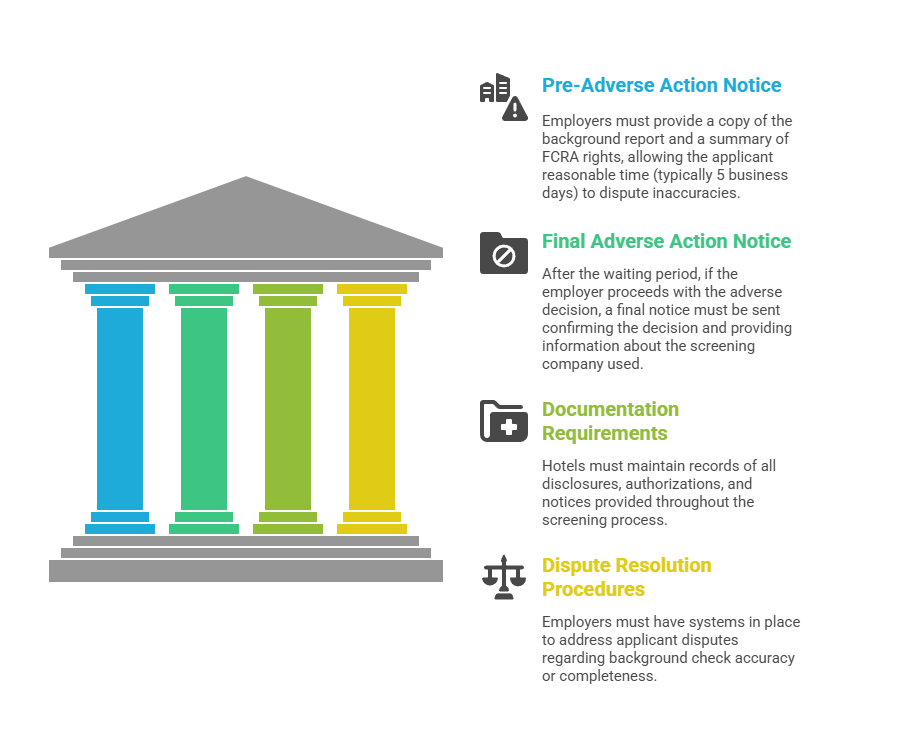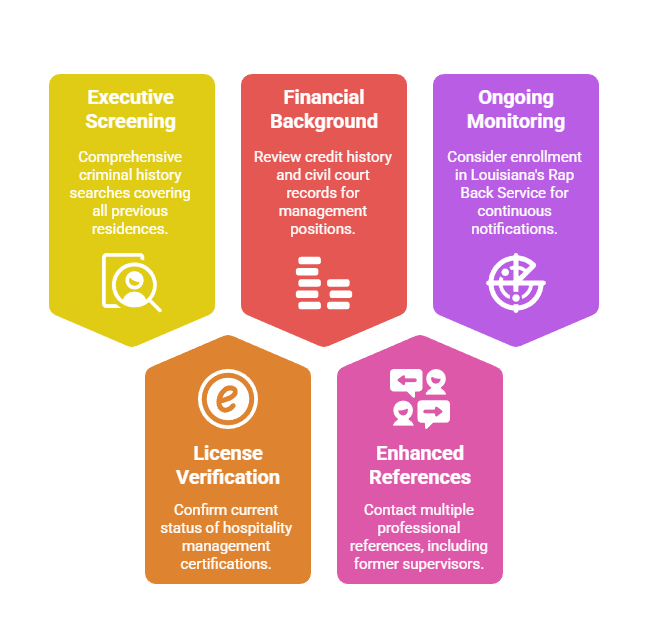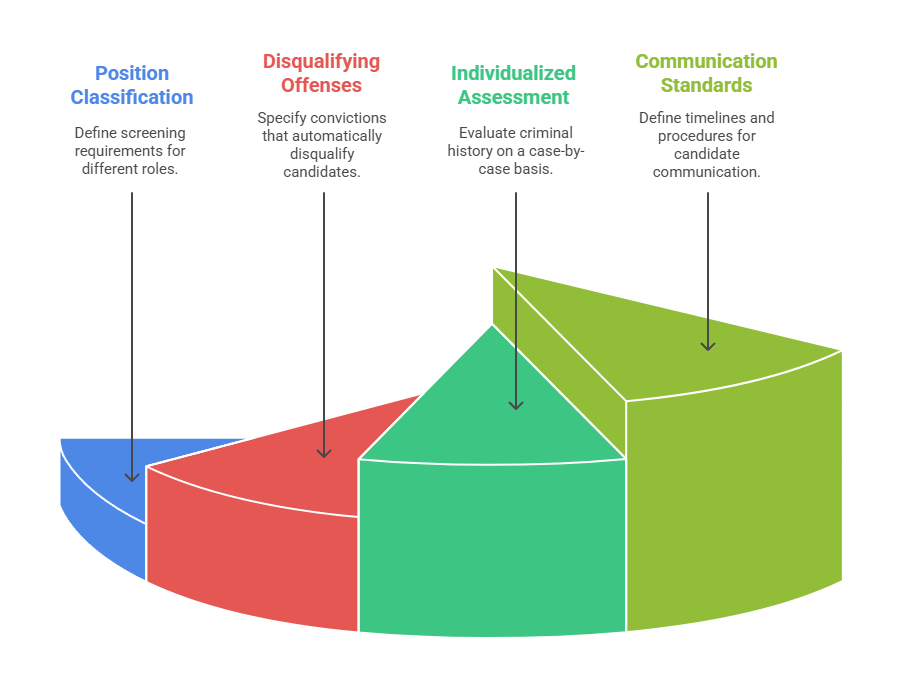Louisiana hotel employers must navigate a complex framework of federal hospitality standards, state employment laws, and tourism-specific regulations when conducting employee background checks, particularly in high-traffic areas like New Orleans' French Quarter and casino-adjacent properties. This guide provides HR professionals with actionable compliance strategies for implementing thorough Louisiana hotel employee background check processes that balance security requirements with the state's unique workforce dynamics and seasonal hiring patterns.
Key Takeaways
- Louisiana hotels must comply with both federal Fair Credit Reporting Act (FCRA) requirements and state-specific employment screening laws, with additional considerations for casino-adjacent properties and tourism-heavy districts.
- Background checks for Louisiana hotel positions typically include criminal history verification, employment history confirmation, identity verification, and sex offender registry searches, with processing times ranging from 2-7 business days depending on scope.
- New Orleans hotels operating in the French Quarter face heightened security screening requirements due to increased tourist traffic and proximity to establishments serving alcohol, requiring more comprehensive vetting procedures.
- Louisiana's "ban the box" provisions under Executive Order JBE 2016-11 restrict when state contractors can inquire about criminal history, though private hotels maintain broader discretion in their hiring practices.
- Seasonal workforce turnover rates in Louisiana hospitality exceed 70% annually, making efficient and cost-effective background screening processes essential for maintaining operational staffing levels.
- Hotels must provide proper FCRA disclosures, obtain written consent before screening, and follow adverse action procedures if denying employment based on background check findings.
- Post-Hurricane Katrina regulations introduced enhanced verification requirements for hospitality workers in disaster recovery zones, affecting hiring practices in coastal and flood-prone Louisiana parishes.
- Comprehensive screening delivers measurable ROI through reduced turnover, decreased theft incidents, and enhanced property reputation in Louisiana's competitive hospitality market.
Understanding Louisiana's Hospitality Employment Landscape
The State's Unique Tourism Industry Structure
Louisiana's hospitality sector employs over 215,000 workers across the state. The industry concentrates in the New Orleans, Baton Rouge, and Lafayette metropolitan areas. The tourism industry contributes approximately $18.7 billion annually to Louisiana's economy, making proper employee vetting critical for maintaining visitor safety and industry reputation.
Louisiana hotel hiring background verification processes must account for distinct employment patterns. These include high seasonal fluctuation, multi-property employment arrangements, and workers simultaneously employed across multiple jurisdictions. The state's unique employment dynamics require flexible yet thorough screening approaches.
The French Quarter alone hosts over 10 million visitors annually. Properties near Bourbon Street face particular scrutiny regarding employee screening. Workers often have access to guest rooms, cash handling responsibilities, and interaction with intoxicated guests, creating security considerations that extend beyond typical hotel operations.
Post-Katrina Regulatory Changes Affecting Hiring
Following Hurricane Katrina's devastation, Louisiana implemented enhanced workforce verification requirements. These regulations aimed to prevent contractor fraud, protect displaced workers, and ensure proper documentation of employment eligibility. Hotels rebuilt or renovated using federal recovery funds faced additional scrutiny regarding their hiring practices.
The Louisiana Workforce Commission established reporting requirements for hospitality employers receiving state assistance. Hotels in Cameron, Jefferson, Orleans, Plaquemines, St. Bernard, St. Tammany, Tangipahoa, and Vermilion parishes must maintain detailed hiring records. These requirements extend beyond typical employment documentation to include verification of screening procedures and adverse action decision-making processes.
Legal Framework for Louisiana Hotel Employee Background Checks
Federal FCRA Compliance Requirements
The Fair Credit Reporting Act establishes nationwide standards for employment background checks. Louisiana hotels must follow specific procedures before, during, and after the screening process. Therefore, understanding FCRA requirements forms the foundation of compliant background screening.
Employers must provide applicants with a standalone disclosure document explaining that a background check will be conducted. This disclosure must be separate from the employment application itself. Written authorization must be obtained before initiating any screening, and this consent form cannot be buried within other employment paperwork.
When adverse employment decisions result from background check findings, hotels must follow a two-step notification process:

- Pre-Adverse Action Notice: Employers must provide a copy of the background report and a summary of FCRA rights, allowing the applicant reasonable time (typically 5 business days) to dispute inaccuracies.
- Final Adverse Action Notice: After the waiting period, if the employer proceeds with the adverse decision, a final notice must be sent confirming the decision and providing information about the screening company used.
- Documentation Requirements: Hotels must maintain records of all disclosures, authorizations, and notices provided throughout the screening process.
- Dispute Resolution Procedures: Employers must have systems in place to address applicant disputes regarding background check accuracy or completeness.
This two-step process protects applicant rights while allowing employers to make informed hiring decisions. Proper documentation of each step demonstrates compliance commitment and protects against potential legal challenges.
Louisiana State Employment Screening Laws
Louisiana does not maintain a comprehensive state-level background check law equivalent to some other states' employment screening statutes. Instead, the state relies primarily on federal FCRA standards with additional sector-specific requirements. This approach provides flexibility while maintaining necessary protections for job applicants.
Executive Order JBE 2016-11 prohibits state agencies and contractors from inquiring about criminal history on initial employment applications. However, this "ban the box" provision applies primarily to government employment and contractors rather than private hospitality businesses. Private Louisiana hotels retain discretion to inquire about criminal history at any point in the hiring process, though best practices suggest delaying such inquiries until after initial qualifications assessment.
Casino-Adjacent Hotel Special Requirements
Hotels located on or adjacent to casino properties face additional regulatory scrutiny under Louisiana Gaming Control Board oversight. The Louisiana Gaming Control Law (LSA-R.S. 27
et seq.) establishes enhanced background investigation requirements for employees working in gaming-adjacent hospitality positions. While not all hotel employees require full gaming licenses, those with access to casino areas, cash handling responsibilities, or security functions may need Louisiana State Police background clearances.
The Louisiana State Police Gaming Division conducts these investigations. Processing times for gaming-related background clearances typically extend 4-8 weeks, requiring hotels to plan hiring timelines accordingly. Properties in Bossier City, Lake Charles, New Orleans, and Baton Rouge with casino operations must maintain clear policies distinguishing between hotel-only positions and gaming-adjacent roles requiring enhanced screening.
Essential Components of Hotel Management Background Screening
Louisiana tourism industry employee verification requires multiple screening components working together. Each element serves specific purposes in creating comprehensive candidate assessments. Moreover, combining these components provides layered protection against hiring risks while maintaining compliance with applicable regulations.
| Screening Component | Purpose | Typical Timeline |
| Criminal History Search | Identifies convictions and pending charges at county, state, and federal levels | 3-7 business days |
| Employment Verification | Confirms work history accuracy and identifies performance patterns | 2-5 business days |
| Education Verification | Validates degrees, certifications, and specialized training credentials | 3-7 business days |
| Identity Verification | Prevents fraud through Social Security number validation and address history | 1-2 business days |
| Sex Offender Registry | Screens against state and national databases for registered offenders | 1 business day |
| Credit History Check | Assesses financial responsibility for positions involving cash handling | 1-3 business days |
| Drug Screening | Tests for controlled substances affecting workplace safety and performance | 1-3 business days |
The combination of screening elements should align with specific position requirements and responsibilities. Entry-level positions may require fewer components, while management and security roles demand comprehensive screening packages.
Criminal History Verification Standards
Louisiana hotel employee background checks should include comprehensive criminal history searches at multiple jurisdictional levels. County-level criminal record searches provide the most detailed conviction information, as Louisiana's 64 parishes maintain independent court systems with varying record-keeping practices. Statewide criminal database searches through the Louisiana Bureau of Criminal Identification and Information offer broader coverage but may contain incomplete or outdated information requiring county-level verification.
Federal criminal searches become necessary when applicants have lived outside Louisiana. Sex offender registry checks through both Louisiana State Police records and the national Dru Sjodin National Sex Offender Public Website are essential for hospitality positions. Hotels should establish clear lookback periods (typically 7 years for most criminal records under FCRA guidance) and position-specific disqualifying offenses aligned with job responsibilities.
Employment and Education Verification
Thorough employment history verification helps Louisiana hotels assess applicant credibility and identify patterns of misconduct or termination. Verification should cover at minimum the past 7-10 years of employment, contacting previous hospitality employers directly rather than relying solely on applicant-provided information. Louisiana's high rate of small, independent hotel properties and restaurant establishments can make verification challenging, as some businesses closed during COVID-19 or following hurricane damage.
Education verification becomes particularly important for management positions. Louisiana's hospitality training programs through institutions like the Louisiana Culinary Institute, Delgado Community College's hospitality programs, and Southeastern Louisiana University's Hammond campus should be verified directly with issuing institutions rather than accepting diploma copies alone.
Position-Specific Screening Requirements
Louisiana Hotel Front Desk Staff Screening
Front desk personnel require comprehensive screening due to their access to guest information and payment processing systems. Louisiana hotel front desk staff screening should emphasize criminal history related to theft, fraud, identity crimes, and violence. These positions represent the hotel's first impression and maintain control over property management systems containing sensitive guest data protected under payment card industry standards.
Key screening considerations for front desk positions include:

- Criminal Background: Focus on theft, fraud, embezzlement, identity crimes, and violent offenses that could endanger guests or compromise financial systems.
- Employment History: Verify at least three previous employers, specifically inquiring about cash handling accuracy, guest complaint resolution, and adherence to security protocols.
- Credit History: Consider for positions involving significant cash handling or financial transaction authority, ensuring such screening relates directly to job responsibilities.
- Reference Checks: Contact professional references who can speak to the candidate's reliability, customer service skills, and trustworthiness with sensitive information.
Professional reference checks should specifically inquire about cash handling accuracy and guest complaint resolution. Many Louisiana hotels implement drug screening for front desk positions, particularly properties operating 24-hour reception desks with overnight shifts.
Hotel Housekeeping Background Check Procedures
Housekeeping staff require thorough screening despite typically having less guest interaction than front desk personnel. These positions involve unsupervised access to guest rooms, personal belongings, and potentially valuable items. Hotel housekeeping background check protocols should focus on theft-related offenses, property crimes, and any history of violating privacy or trust.
Louisiana's housekeeping workforce includes significant numbers of workers for whom English is a second language. Consequently, clear communication of screening procedures and rights becomes essential. Hotels should provide screening disclosures and authorization forms in multiple languages when appropriate to ensure genuine informed consent.
Reference checks for housekeeping positions should verify work quality and reliability. Previous hospitality employers can provide insights into room inspection performance, adherence to sanitation standards, and guest complaint history. Louisiana hotels operating in tourism-heavy areas often employ housekeeping staff seasonally, making efficient screening processes essential for maintaining service levels during peak periods.
Management and Security Position Vetting
Hotel management positions require the most comprehensive background screening. Louisiana hotel security clearance requirements for management include detailed employment verification, education credential confirmation, professional license verification, and financial history review. Hotels should verify hospitality management certifications through organizations like the American Hotel & Lodging Educational Institute and check professional references spanning the candidate's career progression.
Security personnel, maintenance staff with master key access, and night audit positions require enhanced screening similar to management roles:

- Executive-Level Screening: Comprehensive criminal history searches covering all previous residences, federal criminal records, and specialized databases for financial crimes.
- Professional License Verification: Confirm current status of hospitality management certifications, security officer licenses, and any specialized credentials relevant to the position.
- Financial Background: Review credit history and civil court records for management positions with budget authority or significant financial responsibilities.
- Enhanced Reference Checks: Contact multiple professional references, including former supervisors, peers, and direct reports when possible.
- Ongoing Monitoring: Consider enrollment in Louisiana's Rap Back Service for continuous criminal activity notifications for high-level security and management positions.
Louisiana's concealed carry laws and security officer licensing requirements through the Louisiana State Board of Private Security Examiners necessitate additional verification for armed security positions. Properties in high-crime areas or those hosting significant events should implement periodic re-screening for security personnel.
Implementing Compliant Background Check Processes
Selecting Appropriate Screening Partners
Louisiana hotels should partner with Consumer Reporting Agencies (CRAs) that demonstrate FCRA compliance. Additionally, these partners should maintain accreditation through the Professional Background Screening Association (PBSA) and understand hospitality industry requirements. Screening partners should provide transparent pricing structures accounting for Louisiana's multi-parish court system access fees.
Regional screening providers familiar with Louisiana's court systems often deliver faster, more accurate results. However, national providers may offer superior technology platforms and more comprehensive compliance support. Many Louisiana hotels utilize hybrid approaches, engaging regional providers for criminal history searches while leveraging national providers for employment verification and specialized screenings.
Establishing Clear Screening Policies
Written background check policies provide consistency and demonstrate compliance commitment. Louisiana hotel policies should specify which positions undergo screening, what screening components apply to each position level, and disqualifying offenses by position type. Policies must address waiting periods between application and screening initiation, adverse action procedures, and dispute resolution processes.
Essential policy elements include:

- Position Classification: Clearly define screening requirements for entry-level, supervisory, management, and security positions.
- Disqualifying Offenses: Specify which criminal convictions automatically disqualify candidates for different position types, with consideration for offense recency and rehabilitation.
- Individualized Assessment: Establish procedures for case-by-case evaluation of criminal history considering nature, gravity, and time elapsed since conviction.
- Communication Standards: Define timelines for informing candidates of screening status and procedures for addressing applicant questions or concerns.
Louisiana's diverse workforce requires policies accounting for varying education levels and language barriers. Hotels should establish procedures for applicants unable to provide standard documentation, such as workers whose previous employers closed following hurricanes or those with employment gaps related to disaster displacement.
Addressing Louisiana's Seasonal Workforce Challenges
Louisiana's hospitality industry experiences significant seasonal fluctuation. Properties in New Orleans, coastal areas, and event-driven markets require rapid hiring capacity. Seasonal workforce turnover exceeding 70% annually necessitates efficient processes that balance thoroughness with speed.
Streamlining High-Volume Screening
Digital application systems allowing applicants to initiate and complete screening remotely reduce time-to-hire. Batch screening approaches for seasonal hiring surges can reduce per-applicant costs through volume pricing. However, hotels must ensure batch processing doesn't compromise individualized assessment requirements or FCRA compliance standards.
Predictive hiring analytics help Louisiana hotels anticipate seasonal staffing needs. By analyzing historical hiring patterns, hotels can identify peak demand periods months in advance. This foresight allows background screening initiation before immediate vacancy pressure compromises thoroughness.
Managing Multi-Jurisdictional Employment
Louisiana's proximity to Mississippi, Texas, and Arkansas creates common multi-state employment patterns. Hotels must conduct background checks covering all jurisdictions where applicants previously resided or worked. Louisiana-only screening misses critical out-of-state criminal history or employment issues, creating potential liability exposure.
Workers employed simultaneously at multiple Louisiana properties create background check coordination challenges:
- Concurrent Employment Disclosure: Require applicants to identify all current employment relationships during the application process.
- Information Sharing: Consider establishing agreements with other hospitality employers to share screening results where legally permissible.
- Industry Associations: Participate in Louisiana Hotel & Lodging Association discussions about best practices for managing multi-property employment screening.
Multi-state screening increases costs and processing time but provides necessary protection. Therefore, hotels should budget accordingly and communicate expected timelines clearly to applicants.
Cost Considerations and ROI Analysis
Understanding Screening Investment
Louisiana hotel employee background check costs vary significantly based on scope and turnaround requirements. Basic criminal history and employment verification packages typically range from $25-$50 per applicant. Comprehensive screening including multi-state criminal searches, education verification, professional reference checks, and credit reports may cost $75-$150 per applicant.
Volume pricing agreements can reduce per-applicant costs by 20-35% for hotels conducting significant seasonal hiring. However, Louisiana hotels should avoid selecting screening packages based solely on cost. Inadequate screening creates negligent hiring liability exposure far exceeding screening expense savings.
Calculating Background Screening ROI
Effective background screening delivers measurable return on investment. Louisiana hotels implementing comprehensive screening report 25-40% reduction in employee-related theft incidents. Additionally, properties experience 30-50% decrease in early-tenure terminations, significantly reducing recruitment and training costs.
| ROI Metric | Impact of Comprehensive Screening | Measurement Method |
| Employee Theft Reduction | 25-40% decrease in reported incidents | Compare incident reports year-over-year |
| Early Turnover Decrease | 30-50% reduction in 90-day separations | Track retention rates by hire cohort |
| Guest Satisfaction | 15-25% improvement in staff-related scores | Monitor online reviews and survey responses |
| Liability Claims | 40-60% reduction in employee-related incidents | Review insurance claims and legal actions |
| Training Cost Savings | $3,500-$5,000 per prevented early termination | Calculate recruitment and onboarding expenses |
Properties with thorough screening processes experience fewer guest complaints related to staff conduct. Quantifying screening ROI requires tracking metrics including time-to-hire, offer acceptance rates, 90-day retention percentages, and employee-related liability claims.
Best Practices for Louisiana Hotel Employers

Maintaining Consistent Application
Discrimination avoidance requires applying identical screening procedures to all candidates for the same position level. Louisiana hotels must resist temptation to skip or abbreviate screening for urgently needed workers. Inconsistent screening application creates discrimination liability and undermines program effectiveness.
Documentation demonstrating consistent screening application provides essential defense against discrimination claims. Hotels should audit screening records periodically to identify and correct any application inconsistencies. Louisiana's employment discrimination laws prohibit disparate treatment based on protected characteristics.
Conducting Individualized Assessments
EEOC guidance on criminal history consideration requires individualized assessment rather than blanket exclusions. Louisiana hotels must evaluate the nature and gravity of criminal offenses, time elapsed since conviction, and the relationship between criminal history and specific job responsibilities. A theft conviction may disqualify candidates for cash-handling positions while remaining irrelevant for maintenance roles.
Individualized assessment documentation should include written explanation of job duty analysis. Hotels should document specific concerns raised by criminal history findings and consideration of rehabilitation evidence. Louisiana employers should provide candidates an opportunity to present mitigating information such as rehabilitation completion or employment stability since conviction.
Providing Transparency and Communication
Clear communication throughout the screening process improves candidate experience. Louisiana hotels should inform applicants of estimated screening timelines and explain the process transparently. When delays occur—common with Louisiana parish court record access—proactive communication prevents candidate frustration and maintains engagement with top applicants.
Pre-adverse action procedures offer critical opportunity for dialogue about background check findings:
- Information Gathering: Approach conversations as fact-finding rather than adversarial, allowing candidates to explain circumstances or correct inaccuracies.
- Context Consideration: Many candidates possess legitimate explanations for concerning findings, such as identity theft or record expungement not reflected in databases.
- Documentation: Maintain detailed records of all communications during the pre-adverse action period, including candidate explanations and employer reasoning.
Thorough investigation before finalizing adverse decisions protects both hotel interests and candidate rights. This balanced approach demonstrates good-faith compliance with EEOC guidance while maintaining necessary security standards.
Conclusion
Louisiana hotel employee background checks require careful navigation of federal FCRA requirements and state-specific employment laws. Hotels implementing comprehensive, compliant screening processes protect guests, employees, and property interests. The investment in thorough background verification delivers measurable returns through reduced turnover and decreased liability exposure. As Louisiana's hospitality industry continues recovering and growing, proper employee screening remains essential for maintaining the sector's reputation and ensuring visitor safety throughout 2025 and beyond.
Frequently Asked Questions
How long does a Louisiana hotel employee background check take?
Standard Louisiana hotel employee background checks typically take 3-7 business days, though timelines vary based on screening scope and parish court record access. Criminal history searches in Orleans Parish often require 5-7 days due to the complex court system, while rural parish searches may complete in 2-3 days. Comprehensive screenings including employment verification and multi-state criminal searches may extend to 10-14 days. Hotels needing faster turnaround can request expedited processing for additional fees.
What disqualifies someone from hotel employment in Louisiana?
Disqualifying factors depend on specific position responsibilities and hotel policies rather than Louisiana state law. Violent felonies, sexual offenses, theft crimes, and fraud convictions commonly disqualify hospitality candidates. Hotels must conduct individualized assessments considering offense nature, time elapsed, and rehabilitation evidence rather than implementing blanket exclusions. Failed drug tests, employment history falsification, and lack of legal work authorization also typically disqualify candidates.
Are Louisiana hotels required to conduct background checks?
Louisiana law does not mandate background checks for most hotel positions, though specific roles may face requirements. Hotels operating casino facilities or located on casino property must comply with Louisiana Gaming Control Board requirements for certain positions. Despite lack of legal mandate, thorough screening protects hotels from negligent hiring liability, which holds employers responsible for reasonably foreseeable harm caused by employees they should have known posed risks. Many franchise agreements also contractually require background screening regardless of state law.
Can hotels check credit history for Louisiana hospitality positions?
Louisiana hotels may check credit history for positions involving financial responsibilities, though such screening must relate directly to job duties under FCRA standards. Credit checks for front desk positions with cash handling authority or financial management roles are generally defensible. Hotels must provide separate disclosure and obtain specific consent before conducting credit checks, and follow adverse action procedures if denying employment based on credit information. Louisiana does not restrict employment credit checks like some other states.
How far back do Louisiana hotel background checks go?
FCRA guidelines typically limit most criminal history reporting to seven years, though Louisiana law permits reporting of criminal convictions without time limitation. Most Louisiana hotel background checks cover 7-10 years of criminal history, employment verification, and address history. Serious offenses including felony convictions, sex offenses, and violent crimes may be reported beyond seven years. Hotels should establish clear, position-appropriate lookback periods balancing thoroughness with fair chance employment principles.
Do Louisiana hotels screen current employees?
Louisiana hotels may conduct ongoing screening or re-screening of current employees, though less commonly than pre-employment checks. Hotels participating in Louisiana's Rap Back Service through the State Police receive automatic notifications of criminal arrests for enrolled employees. Periodic re-screening often occurs for security personnel, employees promoted to positions with increased responsibilities, or when implementing new screening policies. Hotels must comply with FCRA requirements including disclosure and consent even for current employees.
What happens if a Louisiana hotel job applicant disputes background check information?
When applicants dispute background check findings, Louisiana hotels must pause adverse action processes and allow reasonable investigation time. The screening company must investigate disputed information by contacting original sources and complete investigation within 30 days under FCRA. If investigation reveals inaccuracies, the CRA must correct or delete erroneous information and provide updated reports. Hotels should not finalize adverse employment decisions until dispute resolution concludes.
Are there special background check requirements for New Orleans hotel workers?
New Orleans hotels follow the same Louisiana state requirements as properties elsewhere in the state. However, properties in the French Quarter or casino-adjacent locations may implement more stringent voluntary screening due to security considerations. Orleans Parish criminal record searches require accessing multiple court systems, often extending processing times compared to other Louisiana parishes. Properties in entertainment districts with significant alcohol service often conduct more thorough criminal history checks.
Additional Resources
- Louisiana State Police Bureau of Criminal Identification and Information - Background Check Services
https://www.lsp.org/bcii.html - Federal Trade Commission - Using Consumer Reports for Employment Purposes
https://www.ftc.gov/business-guidance/resources/using-consumer-reports-what-employers-need-know - EEOC Guidance on Consideration of Arrest and Conviction Records
https://www.eeoc.gov/laws/guidance/enforcement-guidance-consideration-arrest-and-conviction-records-employment - Louisiana Workforce Commission - Employer Resources
https://www.laworks.net/WorkforceDevelopment/WFD_EmployerServices.asp - Louisiana Gaming Control Board - Licensing and Background Investigations
https://www.doa.la.gov/osr/gaming/licensing.htm - Professional Background Screening Association - FCRA Compliance
https://www.pbsa.org/compliance
